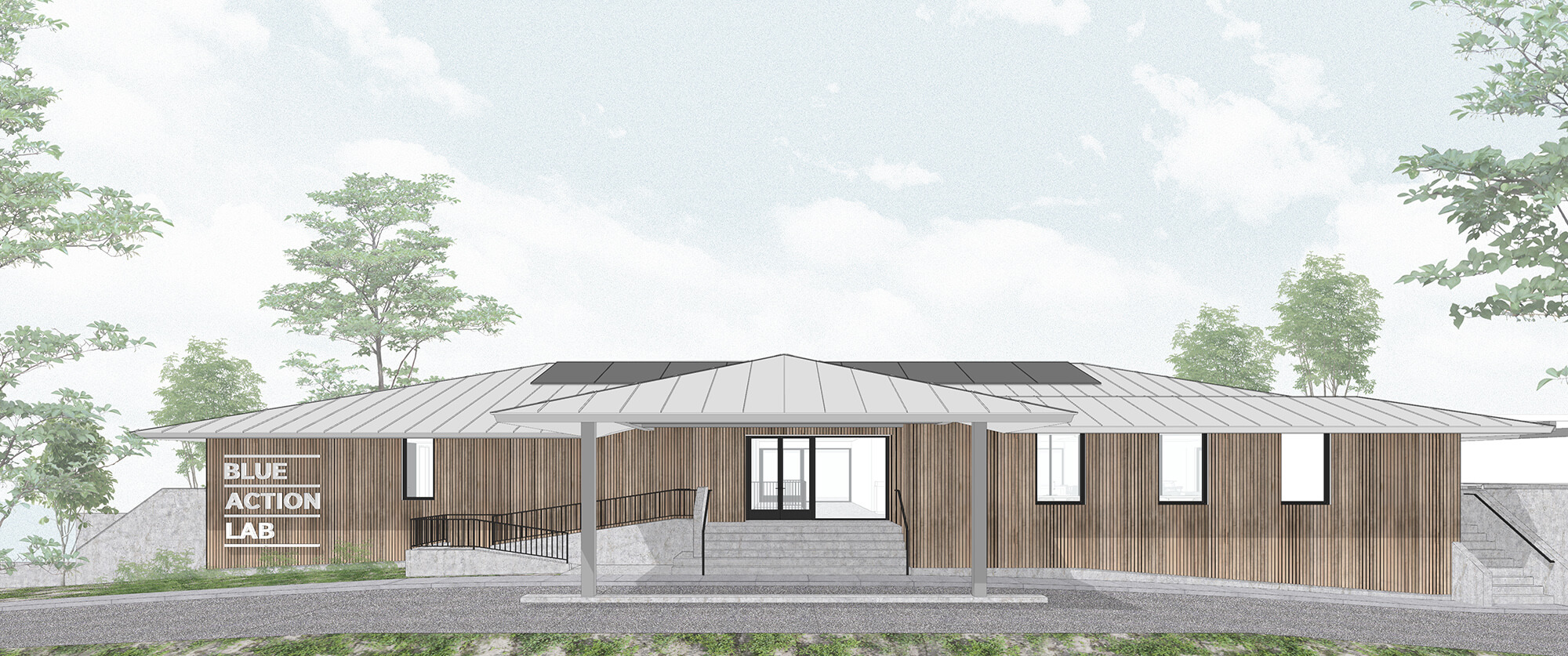In our Changemakers in Action series, we meet dedicated sustainability and social justice leaders and learn how they are bringing about positive change. We’re pleased to feature a guest post from Presidio alum Rupert Hayward, co-founder and President at the Blue Action Lab, and executive director of the Grand Bahama Port Authority, Port Group, Ltd., and the Grand Bahama Disaster Relief Foundation. Rupert, who received his MBA from Presidio Graduate School in 2015, is working to empower low-lying and coastal islands around the world to take advantage of the emerging $3 Trillion blue economy and leverage ESG, ocean, and climate-smart solutions to build a resilient future.
I graduated from Presidio Graduate School’s MBA in Sustainable Solutions program in May 2015, and in December of that year returned home to the island of Grand Bahama, in the northern Bahamas.
As a third-generation Bahamian, I grew up witnessing first-hand the effects of climate change on coastal communities. I studied sustainable business practices in Europe and the U.S. with the hopes of bringing these practices back to The Bahamas. My experience at Presidio Graduate School was transformative. My degree in sustainable business management empowered me with the tools and resources to create innovative financial instruments and investment opportunities to mitigate the increasing threat of climate change.
Out of this crisis, I also recognized an opportunity: investing in sustainability entrepreneurs working to solve the world’s biggest problems. After nearly a decade working in finance in Europe and the U.S., I returned home with a renewed sense of purpose. With a global community of like-minded sustainability investors and innovators behind me, I accepted an opportunity to join the Grand Bahama Port Authority and immediately began to develop and implement new, sustainable value propositions within the 230-square-mile free trade zone on the island of Grand Bahama.
In the past five years since I returned home, two massive hurricanes made landfall in Grand Bahama in 2016 and 2019 causing significant damage and devastation. In 2019, the entire world watched in horror as Hurricane Dorian covered 70% of the island with up to 20 feet of seawater—and in Dorian’s wake, the question of a sustainable future for the Bahamas became one of an existential nature.
After years of working hand-in-hand with the local government to advance infrastructure and development projects, I knew that the Bahamian government lacked the resources to invest sufficiently in large-scale storm remediation infrastructure. Drawing on my sustainable management background, I developed the plan for the Blue Action Lab: a sustainable development model to incubate and develop technologies and solutions and to empower the Bahamian people to protect their island from the effects of larger storms and rising seas.
 The Blue Action Lab (Action Lab) is building a scalable model for place-based, inclusive economic development to empower low-lying and coastal islands around the world to take advantage of the emerging $3 Trillion blue economy and leverage ESG, ocean, and climate-smart solutions to build a resilient future.
The Blue Action Lab (Action Lab) is building a scalable model for place-based, inclusive economic development to empower low-lying and coastal islands around the world to take advantage of the emerging $3 Trillion blue economy and leverage ESG, ocean, and climate-smart solutions to build a resilient future.
At the front lines of the climate crisis, island and coastal communities are confronted with a stark reality: find solutions to rising seas, increasing storm intensity, and the degradation of marine ecosystems, or face relocation and ruin. The Action Lab is developing the technologies and models needed to empower these communities to thrive in the face of climate change. In fact, islands like Grand Bahama are living laboratories for the circular economy, where climate resilience, sustainable solutions, and ocean-based strategies create immense value.
The Action Lab serves as a hub for the rapid development, testing, structuring, financing, and scaling of climate-resilient models and technologies through investment and partnerships to build resilient infrastructure, develop new aquaculture, agriculture, and mariculture solutions and technologies, and implement education and workforce training programs. The Action Lab’s location in the free-trade zone of Freeport, Grand Bahama offers key advantages through established partnerships with the government of the Bahamas and the Grand Bahama Port Authority that allow for streamlined permitting processes and access to thousands of acres of undeveloped coastal and marine environments. Along with the guided business support of a dedicated on-the-ground team, the regulatory advantages of the free-trade zone of Freeport will allow for expedited execution of research and business plans for innovative coastal and ocean resilience solutions.
Through a global network of partnerships and industry-leading advisors to facilitate mentorship and access to capital, the Action Lab will build an inclusive innovation ecosystem of research institutes, mission-aligned businesses, and community leaders.
The Action Lab focuses on solution strategies at the nexus of climate change mitigation and adaptation. Scientists, entrepreneurs, and educators will have access to a physical testing ground where they can exchange ideas and implement the solutions needed for a resilient and sustainable future. These efforts will provide substantial social, economic, and environmental co-benefits and will jumpstart the economy of The Bahamas and beyond. Our place-based initiative will serve as a model for the equitable development of new Caribbean industries ready to lead the world in the emerging resilience and blue economy marketplace.
A truly sustainable future is rooted in building equitable and resilient institutions and communities. To that end, the Action Lab is dedicated to helping raise the next generation of informed, empowered, and equipped businesses and citizens in The Bahamas and beyond. The 21st century will be full of challenges for low-lying coastal and island states and their surrounding oceans. New and adaptive institutions are needed to generate innovative, closed-loop systems and the skilled workforce required to operate them. Inclusive and sustainable by design, the Action Lab will empower communities to take action against climate change and become a transformative model for resiliency worldwide.

